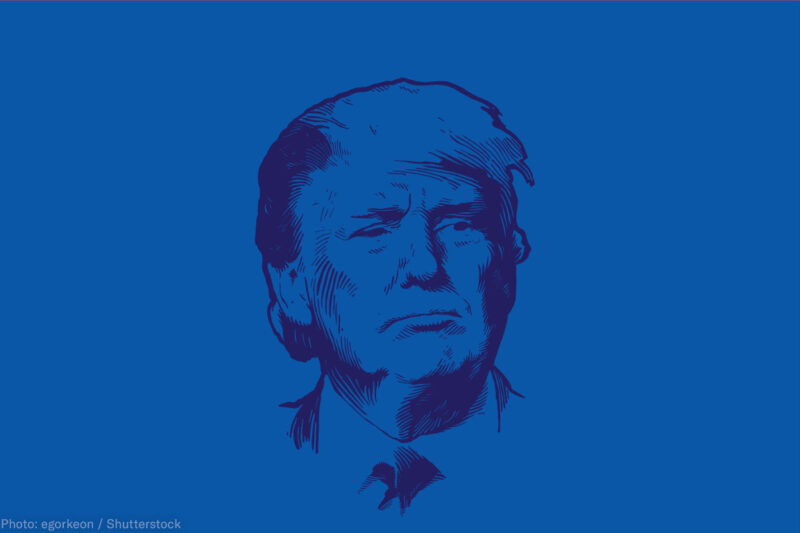
In his first year in office, Donald Trump has proved to be simultaneously the most dangerous and the most frustrated president in living memory. The danger is clear: He seems unable to control his most basic impulses, and those impulses are shaped more by concern about his image than about the Constitution or the people’s best interests. He has sought to ban Muslims, increase deportations, intimidate the media, repeal Obamacare, bar transgender people from serving the military, and threaten football players taking a knee to oppose racial injustice.
The threat he poses continues.
But he has also proved to be one of the nation’s least effectual presidents — even though he enjoys Republican majorities in both houses of Congress. That’s because Americans who care about civil rights, civil liberties, the rule of law, and basic human dignity have stood up to him. And if Americans continue to mobilize in defense of these values, Trump will continue to be stymied. That is our job as citizens — to ensure that a president who tends toward authoritarianism is checked at every juncture. And that is also our job at the ACLU.
Thus far, those who have stood up for civil rights have often succeeded. Courts have struck down three iterations of Trump’s “Muslim ban,” finding it a violation of the Establishment Clause and contrary to immigration law. Trump has been unable to repeal the Affordable Care Act, or Obamacare, despite repeated efforts and ultimatums. His administration’s threat to deny federal funds to cities and states that adopted sanctuary policies has been declared invalid. So, too, has his ban on transgender people serving in the military. And the courts also overruled his administration’s effort to block an undocumented minor’s access to an abortion.
These victories, many of them in cases brought by the ACLU, have mostly come in courts. But the victories have been made possible by the remarkable upsurge in citizen engagement on these issues. From the Women’s March to the airport demonstrations, from the town halls to preserve the ACA to the many demonstrations in support of young immigrants known as Dreamers, Americans have chosen to stand up and stand together against the president’s actions and policies. And in a constitutional democracy, that is ultimately how we preserve liberty. Courts are an important bulwark against abuse, but they are most effective where there is substantial popular opposition to the actions they are reviewing. The courts cannot do it alone.
I examined the central role of citizen mobilization in defense of liberty in my book, "," now with a revised introduction and conclusion that addresses the particular threat represented by Trump. Citizens coming together and acting strategically resulted in three of the most successful constitutional reform movements in the last quarter century. Because of citizen activism, marriage equality went from unthinkable to inevitable; the individual right to bear arms, dismissed as a fraud by Chief Justice Warren Burger in 1990, was recognized as a constitutional right by the Supreme Court in 2008; and the Bush administration’s most aggressive “war on terror” initiatives were abandoned or substantially curtailed by the time he left office.
In each instance, civil society organizations — groups like the ACLU, the Center for Constitutional Rights, Lambda Legal Defense Fund, and the National Rifle Association — led the way. Few people will agree with all the goals of all of these groups. But anyone who cares about liberty should study how these groups advanced and defended their causes.
Our constitutional system depends as much or more on the work of citizen groups as it does on lawyers in court or the judges themselves. Civil society institutions — including the nonprofit sector, the press, the academy, and organized religion — play an often underappreciated role in shaping and defending constitutional liberties and in checking government abuse. Trump is learning that lesson every day, much to his dismay.
The founders of the ACLU understood this in 1920 when they established a citizens’ organization dedicated to defending liberty in the streets as much as or more than in the courts. Ever since, we have done just that. In the wake of Trump’s election, our membership quadrupled, from 400,000 to more than 1.6 million. We have encouraged our members to engage directly in the fight for liberty, , a nationwide initiative that encourages, coordinates, and facilitates activism at the local level. And as we promised, we have seen the Trump administration in court, challenging its actions on immigration, voting rights, LGBT rights, national security, and reproductive rights.
In 1944, Learned Hand, who served on the U.S. Court of Appeals for the Second Circuit and is widely considered one of the country’s greatest judges ever, also recognized the importance of the citizenry’s defense of constitutional rights. Addressing a crowd of 150,000 newly naturalized citizens in Central Park, he told them that “liberty lies in the hearts of men and women; when it dies there, no constitution, no law, no court can save it ... While it lies there, it needs no constitution, no law, no court to save it.” At the ACLU, we seek to nurture the liberty that lies in the hearts of men and women. And as Trump is discovering, that liberty is not easily vanquished.

